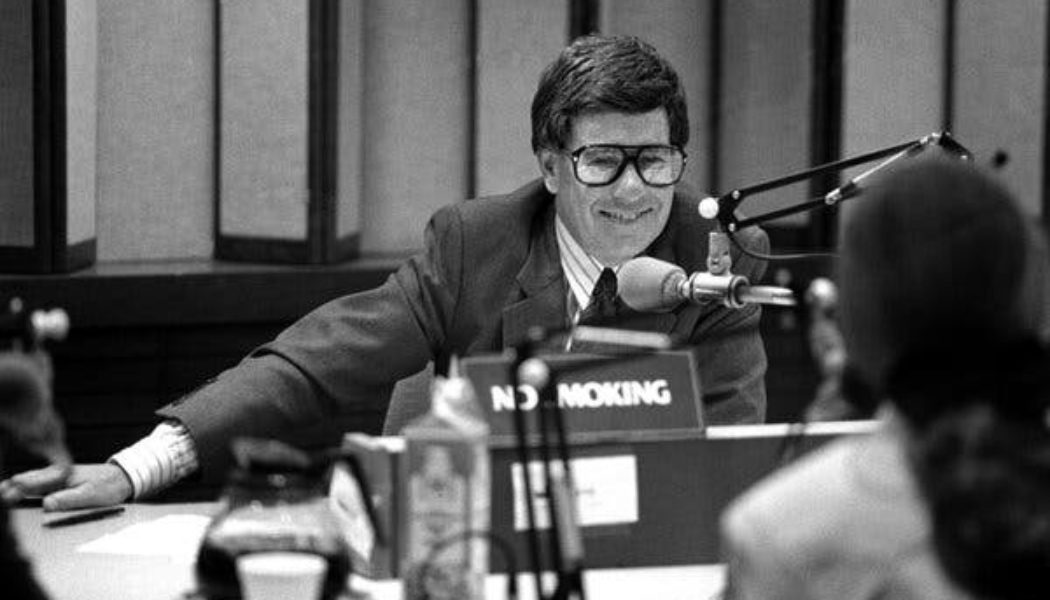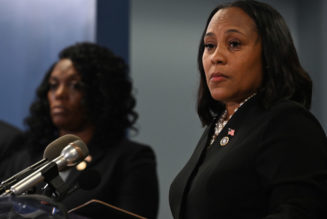For more than five decades, he brought together emerging classical and folk performers as well as established stars for interviews and live performances.

Robert Sherman, a charming, easygoing radio personality who hosted three long-running shows over more than a half-century on the New York classical music station WQXR-FM, died on Tuesday at his home in Ossining, N.Y., in Westchester County. He was 90.
His son Steve said the cause was a stroke, the fourth Mr. Sherman had had since 2021.
Mr. Sherman had been working behind the scenes at WQXR for more than a decade before he began hosting “Woody’s Children,” a weekly folk music program, in 1969. A year later, he began “The Listening Room,” a daily program on which both established and emerging musicians were interviewed and played live music for 23 years. His guests included Jessye Norman, Itzhak Perlman, Robert Merrill and Leopold Stokowski.
And in 1978, he started “Young Artists Showcase,” a weekly show that offered a prestigious platform for up-and-coming musicians to perform. That program is still on the air.
“Bob, in many ways, embodied everything WQXR tried to be,” Ed Yim, the station’s chief content officer, said in a phone interview. “He was a guiding spirit. He supported young artists and approached classical music as being for everyone. He’s someone we all turned to when we wanted to know the history of something, or why we did things a certain way.”
Mr. Sherman, whose mother was the concert pianist and teacher Nadia Reisenberg, wanted to conduct interviews that took flight as friendly conversations, rather than limiting his guests to answering prepared questions.
In 1974, for example, he was speaking off the air to the contralto Marian Anderson during a news break on “The Listening Room” when, he later recalled, she said it had been many years since she heard one of the recordings he had just played. Back on the air, he asked her if she listened much to her own music.
“When there’s listening time for our records, very often we make the choice to take the other things,” she said. But, she added after discussing some of her musical preferences, “music, in any case, gives one a great sense of quiet, and that is the kind I like rather than that which is discordant.”
The pianist Emanuel Ax was on “The Listening Room” several times in his 20s, before he became famous. He recalled how welcoming Mr. Sherman had been.
“For someone so young, it was a big deal,” he said by phone, adding that he took easily to being on the radio. “The thing he let me do, which I flipped for, is he used to let me read some of the ads on the show. Each time I’d come on, he let me say, ‘And now, Emanuel Ax is going to read the following ad.’”
Mr. Ax was among the performers at a concert celebrating Mr. Sherman’s 90th birthday last year, which Mr. Sherman himself hosted, as were the violinists Chee-Yun Kim, Joshua Bell and Ani Kavafian and the Emerson String Quartet. Ms. Kim, who also spoke, discussed her first appearance on “Young Artists Showcase,” when she was a teenager.
“I never spoke on a radio station ever, not even in Korea,” she said. “And I said to you, ‘I am so nervous, but it’s a live show — what if I make a mistake?’ And you told me, do you remember what you told me, you said: ‘Just talk to the microphone as you’re talking to me and people happen to listen in. That’s it. It’s just us two.’ And I was like, OK.”
Robert Sherman was born on July 23, 1932, in Manhattan. His parents were immigrants: His father, Isaac, who ran an import-export business and other companies, was from Ukraine. His mother, Ms. Reisenberg, was Lithuanian.
She taught Robert to play piano — with limited success.
“I had a certain talent for it and lacked the discipline to do anything,” Mr. Sherman said in an interview in 2019 for the Avery Fisher Artist Program oral history project. “Mother always told me, ‘For heaven’s sake, don’t tell anybody you study with me, because you’re not typical of my class.’”
He joked that he chose to attend the academically rigorous Stuyvesant High School, where he figured he would be the best pianist, rather than a performing arts school, where he assumed he would be the worst.
After graduating from New York University with a bachelor’s degree in sociology in 1952, he earned a master’s degree in music from Teachers College, Columbia University. He then entered the Army, where he played piano in a band that toured in U.S.O. shows.
He joined WQXR — which until 2009 was owned by The New York Times — in the mid-1950s as a clerk and typist. He gradually moved up to director of recorded music and then music director; by 1969, he was program director. He also wrote scripts for a show called “Folk Music of the World,” but he wanted to create a different type of program that was more connected to the contemporary surge in folk music’s popularity.
His proposal was approved, but the station interviewed other potential hosts, including Pete Seeger, before choosing Mr. Sherman. The show was called “Woody’s Children,” after a reference by Mr. Seeger, on the first episode, to the singer-songwriters who followed Woody Guthrie. WQXR canceled the program in 1999, saying it no longer fit the station’s format. But it was picked up by the Fordham University station WFUV, where it ran until earlier this year.
Mr. Sherman’s guests on “Woody’s Children” over the years included Judy Collins, Odetta, Tom Paxton and Peter, Paul and Mary.
“After nearly 55 years on the radio dial,” Rich McLaughlin, WFUV’s program director, said in a statement after Mr. Sherman’s death, “‘Woody’ is as much Sherman as he is Guthrie.”
Mr. Sherman hosted “The Listening Room” until WQXR canceled it in 1993. “Young Artists Showcase,” which he hosted for 45 years, has continued with guest hosts.
Mr. Sherman also wrote music criticism for The New York Times; hosted “Vibrations,” a short-lived music show on the New York public television station WNET, in 1972; and collaborated with Victor Borge, the comic piano virtuoso, on two books, “My Favorite Intermissions: Lives of the Musical Greats and Other Facts You Never Knew You Were Missing” (1971) and a sequel, “My Favorite Comedies in Music” (1980).
With his brother, Alexander (who died in 2013), Mr. Sherman compiled a book about their mother, “Nadia Reisenberg: A Musician’s Scrapbook” (1986), which used interviews, letters, photographs and newspaper clippings to tell her story.
“I really didn’t want to do the typical artist’s biography, which is that she played here, she played there, and everybody loved her,” Mr. Sherman told The Standard-Star of New Rochelle, N.Y. “I wanted to make it more personal and at the same time more documentary.”
In addition to his son Steve, a performing arts photographer, Mr. Sherman is survived by his partner, Jill Bloom; another son, Peter; and four grandchildren. His marriage to Ruth Gershuni ended in divorce; his marriage to Veronica Bravo ended with her death in 2012.
At Mr. Sherman’s 90th-birthday concert, the cellist Yo-Yo Ma remembered being invited to the WQXR studio at the Times building for an interview when he was 15. He was so anxious, he said, that he steeled himself by drinking several gin and tonics in a nearby bar. (He had an ID from the Juilliard School that said he was 23.)
“I bumped into you the next day,” he recalled to Mr. Sherman, “and you said, ‘Yo-Yo, I just want you to know I spent all last night splicing’ — this was in the days of tape — this interview from completely unintelligible sentences, and I turned it into something that made even a tiny bit of sense.’”









